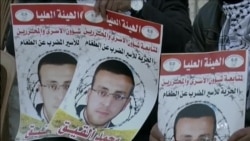The Office of the High Commissioner for Human Rights has raised concerns about Palestinian journalist Mohammed Al-Qeeq, who has been on a hunger strike for more than two months in an Israeli jail.
Al-Qeeq is protesting being held without trial or specific charges. His health has deteriorated so much that Israeli authorities decided to force feed him.
Israel's Supreme Court is scheduled to rule Thursday on whether to release the 33-year old journalist.
Detention law
Al-Qeeq is held under Israel's administrative detention law, which allows the state to hold prisoners without trial, for security reasons.
On Wednesday, James Heenan, head of the United Nations human rights agency, condemned that law.
"Mr. Al-Qeeq is complaining about issues of the legality of detention and conditions of detention, particularly administrative detention in Israel. The International human rights community, particularly the Human Rights Committee has maintained that that form of detention should be ceased," Heenan said.
"The detention is based often on vague grounds on secret evidence. It can be prolonged indefinitely and for these reasons the United Nations Human Rights Committee has called for Israel to end this system of administrative detention," he added.
The journalist from Ramallah, who is married and the father of two children, went on a hunger strike four days after his November 21 arrest, and is reportedly very ill.
Israeli authorities have transferred him to a hospital where reports say he has been fed intravenously, contrary to his wishes.
'Could not talk...or hear'
"A short while ago, the lawyer told us that Mohammed is in a dangerous condition and getting worse every day. He is losing the feeling in some parts of his body. Today, Mohammed could not talk at all or hear. He even did not recognize his lawyer," Hamam Al-Qeeq, the journalist's brother, said Wednesday.
Israel is holding about 600 Palestinians under the administrative detention law, which is usually applied to people suspected of inciting violence or planning terror attacks. The number of detainees has grown in recent months after Palestinians began a campaign of stabbings and car attacks on Israeli soldiers and civilians.
The use of the decades-old policy of detention without formal charges has drawn international criticism.





